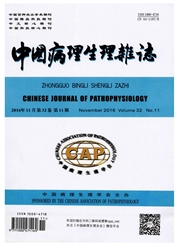

 中文摘要:
中文摘要:
目的:通过体外细胞及体内动物实验,研究肿瘤坏死因子α(TNF-α)诱导的4-羟基壬烯酸(4-HNE)致敏肝细胞发生死亡的作用及机制。方法:以人肝细胞株HepG2及小鼠原代肝细胞为细胞模型,通过乳酸脱氢酶(LDH)释放及MTY比色法检测4-HNE对TNF-α诱导的肝细胞死亡的作用,利用Western blotting技术检测细胞内4-HNE与蛋白质形成的加合物水平,通过Western blotting和ELISA技术检测细胞核内NF-kB(p65)的表达及其与DNA结合活性。以C57BL/6小鼠为动物模型,利用HE染色、ELISA、Western blotting及TUNEL等技术,检测长期摄入酒精前后动物肝组织形态、甘油三酯(TG)水平、4-HNE水平、TNF-α水平及血浆丙氨酸氨基转移酶(ALT)活性的变化。结果:(1)4-HNE可以显著增加HepG2细胞及小鼠原代肝细胞对TNF-α杀伤作用的敏感性,从而使TNF-α诱导4-HNE致敏的肝细胞死亡。(2)4-HNE可显著提高HepG2细胞内4-HNE-蛋白质加合物的水平。(3)4-HNE抑制HepG2细胞内TNF-α介导的NF-kB活化。(4)长期摄入酒精导致小鼠肝细胞内4-HNE和TNF-α水平升高,引起肝细胞内TG水平升高,血浆ALT活性升高,肝细胞死亡增多。结论:长期摄人酒精使肝细胞发生氧化应激,其产物4-HNE可作为一种肝细胞致敏因子,通过抑制肝细胞内TNF-α介导的NF-kB抗细胞凋亡信号通路,诱导酒精性肝损伤。这可能是一种新的酒精性肝病发病机制。
 英文摘要:
英文摘要:
AIM: To study the role of 4-hydroxynonenal (4-HNE) in hepatocyte death induced by tumor nec- rosis factor α (TNF-α). METHODS: Human liver cell line HepG2 and primary mouse hepatocytes were used to establish the cell model. The effect of 4-HNE on TNF-α-induced cell death was determined by lactate dehydrogenase (LDH) release and MTY assays. The intracellular levels of 4-HNE-protein adducts were determined by Western blotting. The intranuclear NF-kB (p65) and its DNA binding activity were detected by Western blotting and ELISA, respectively. Long-term intake of alcohol in C57BL/6 mice Was performed to establish the animal model. The histological changes of mouse hepatic tissues and the apoptosis of hepatocytes were observed by HE staining and TUNEL assay, respectively. The hepatic levels of tri- glyceride ( TG), TNF-α and 4-HNE-protein adducts, and the plasma activity of alanine aminotransferase (ALT) were also detected. RFSULTS : ( 1 ) 4-HNE significantly increased the sensitivity of HepG2 cells and primary mouse hepatocytes to the killing effect of TNF-α. (2) 4-HNE significantly increased the intracellular levels of 4-HNE-protein adducts. (3) 4- HNE inhibited TNF-α-mediated NF-kB (p65) activation in HepG2 cells. (4) Long-term intake of alcohol in mice resulted in high hepatic levels of 4-HNE and TNF-α, accompanied with the increases in hepatic TG content, plasma ALT activity and hepatocyte death. CONCLUSION: Long-term intake of alcohol induces oxidative stress and produces 4-HNE as a hepatocyte-sensitizing factor, which inhibits TNF-α-mediated NF-kB anti-apoptotic signaling pathway in hepatocytes, thus inducing alcoholic liver damage.
 同期刊论文项目
同期刊论文项目
 同项目期刊论文
同项目期刊论文
 期刊信息
期刊信息
